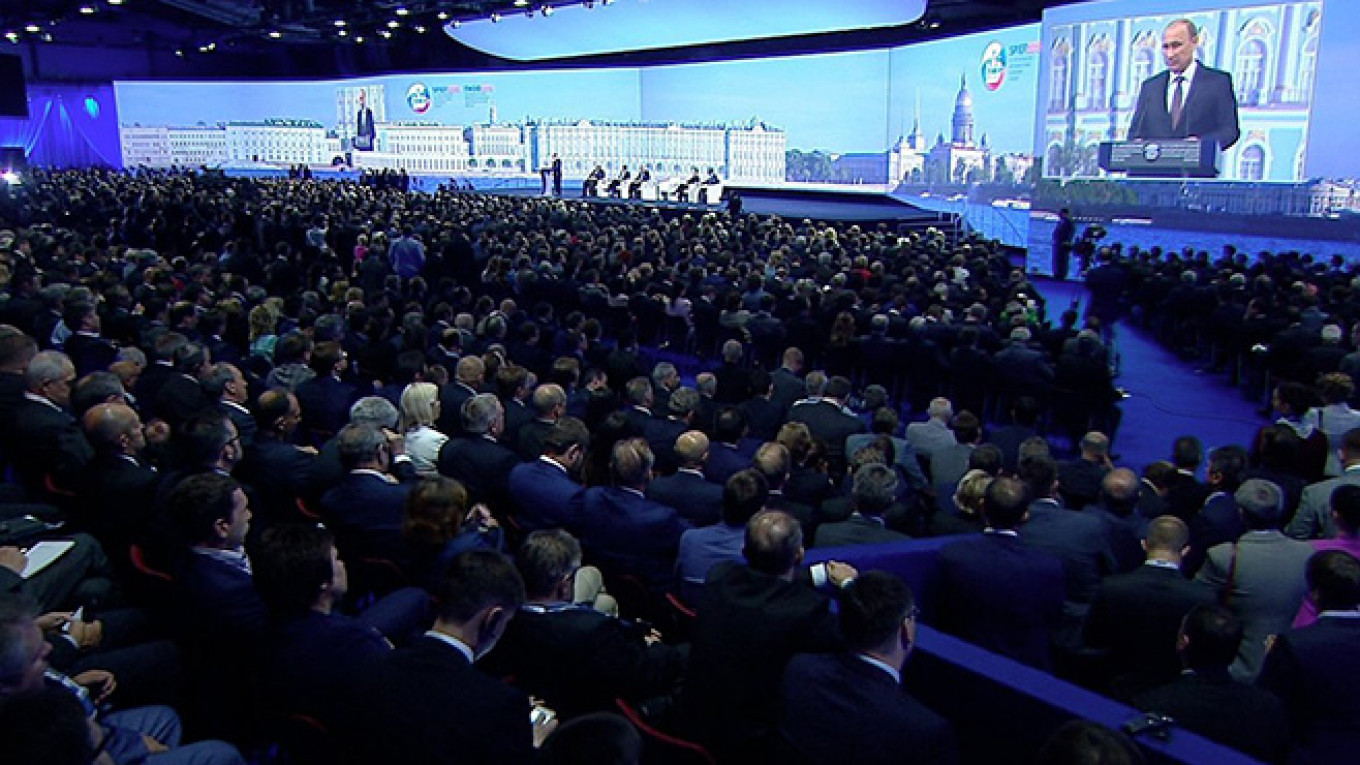The first day of St. Petersburg International Economic Forum kicked off on Thursday, with 10,000 visitors joining political and business leaders at Russia's biggest economic event of the year.
These were the main takeaways from day one of the forum.
1. Former French President Sarkozy Wants To Become Russia’s Best Friend
Former French President Nicolas Sarkozy said Russian President Vladimir Putin should make the first move in cancelling the sanctions regime. The Kremlin imposed an counter-sanctions embargo against Western food products in 2014 following U.S. and EU sanctions against Moscow.
“I believe we need to remove sanctions. The strongest must offer his hand first … The most powerful side here is Russia and the President Putin,” Sarkozy said, as quoted by the RIA Novosti news agency.
Russia did not appear to welcome the suggestion, with Economic Development Minister Alexei Ulyukayev telling forum visitors that Russia was already preparing the documents to prolong the embargo and was not considering lifting sanctions.
2. Ban Ki-moon Wants Russia and the West To Talk
In an opening ceremony speech, UN Secretary-General Ban Ki-moon called for ties to be restored between Russia and the West. “We need to strengthen communication and build bridges, rather than build walls,” he said.
In the interview with the TASS news agency prior to the forum, the UN Secretary-General said that he believed that Russia and the West would overcome their disagreements. “Only a compromise, dialogue, and the collective efforts of the international community, with the participation of Russia as a key member of this community, can pave the way forward,” he told TASS.
3. Lukoil Is Gearing to Sell Its European Assets
Russian oil giant Lukoil is to sell its European assets, company president Vagit Alekperov announced today at the SPIEF Forum. Lukoil plants in Italy, Romania, Bulgaria and the Netherlands are to be sold as a whole or separately, Alekperov said.
“We have been mostly focusing on the exploration and development of oil and gas fields in recent years,” Alekperov told the RBC website. He described the European plants as “not strategic” for the company.
4. Kudrin Is Not Optimistic About the Oil Price
Former Finance Minister and the Chairman of the Center for Strategic Research, Alexei Kudrin, revealed his forecast for global oil prices. Prices are expected to remain volatile in the next three years, and would most likely range between $40-60 per barrel, Kudrin said.
“We are currently in a period of adaptation, taking into account new technologies and renewable sources. A new balance should occur in roughly the next two years,” the former minister added.
5. Sergei Lavrov Wants John Kerry to Be More Patient
Russian Foreign Minister Sergei Lavrov said that his US counterpart John Kerry should “be more patient” regarding the ongoing war in Syria.
Lavrov's words followed a statement on the US State Department website, which said that Washington’s patience concerning Syria was “not unlimited.”
“I saw the statement and was very surprised. Usually John is a moderate politician, I do not know what happened,” Lavrov said, the RBC news website reported. “We should probably be less impatient and more patient- especially since President Obama has repeatedly said that his administration is pursuing a policy of strategic patience.”
6. Putin Set to Continue Soft Power Offensive In Friday Speech
Russian President Vladimir Putin is to speak at the forum tomorrow, Friday, meeting with President of the European Commission Jean-Claude Juncker. He is expected to use his speech to call for better relations between Russia and the European Union, the Bloomberg news outlet reported Thursday.
Contact the author at [email protected]. Follow the author on Twitter at @a_bazenkova.
A Message from The Moscow Times:
Dear readers,
We are facing unprecedented challenges. Russia's Prosecutor General's Office has designated The Moscow Times as an "undesirable" organization, criminalizing our work and putting our staff at risk of prosecution. This follows our earlier unjust labeling as a "foreign agent."
These actions are direct attempts to silence independent journalism in Russia. The authorities claim our work "discredits the decisions of the Russian leadership." We see things differently: we strive to provide accurate, unbiased reporting on Russia.
We, the journalists of The Moscow Times, refuse to be silenced. But to continue our work, we need your help.
Your support, no matter how small, makes a world of difference. If you can, please support us monthly starting from just $2. It's quick to set up, and every contribution makes a significant impact.
By supporting The Moscow Times, you're defending open, independent journalism in the face of repression. Thank you for standing with us.
Remind me later.






